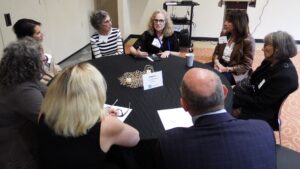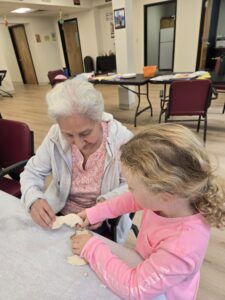Interview: Sharon Gordon of JCC of MetroWest
December 9, 2024We spoke with Sharon Gordon, Chief Program Officer at JCC of MetroWest NJ, about the Littman Family Memory Center. JCC of MetroWest was the recipient of a multi-year, $294,739 grant to expand the Center to create a second program for seniors with moderate memory impairment.

1) Tell us about the new program for seniors with moderate memory impairment. What sets it apart from the existing program?
The expansion enables us to provide more support and different
activities than the current Littman Center. The original program is geared to those with mild impairment who can succeed in a structured environment where all participants are involved in the same activity at the same time. Dementia certainly is not consistent among those affected and is a degenerative disease which leads to cognitive decline. The original program is not appropriate for those who need much more attention with fluid programming.
So, for the program for those with moderate dementia, for example, we recently added a “sing along” program. Some who are not so verbal are able to sing and it is a great equalizer among the participants. The group is visited by children from our Early Childhood Center on a regular basis and it is remarkable how this interaction affects our participants. When with young children we see the nurturing side of their personalities. It is beautiful that they are not the ones needing care and that they are leading the children.
2) How do the two programs complement each other?
All participants go through an intake process during which we decide which program will best fits their needs and where they will be most successful.
A major advantage of having both programs is that as participants are no longer appropriate or are no longer engaging in the program for those with mild dementia, we refer them to the new program. Previously we had to refer them to another medical daycare program which was run very differently and is much more clinical than social. More often they just stayed home with an aide or their spouse. Now, they move seamlessly to another room and while it takes some getting used to, the Directors work towards ensuring that the transition is as smooth as possible.
3) A hallmark of the program is the emphasis on person-centered care. How does this manifest in the program’s offerings?
 Activities are based on individuals’ needs and interests. It is not unusual to have some of the members involved in a discussion while others are painting or doing another activity. One participant takes a daily 15-minute nap because that is her schedule and what she needs to be successful the rest of the day. That would not be possible in the other program. We have a participant who gets agitated sometimes and our wonderful staff brought in clothes to fold. The action of being helpful and busy keeps her calm, feeling useful and happy.
Activities are based on individuals’ needs and interests. It is not unusual to have some of the members involved in a discussion while others are painting or doing another activity. One participant takes a daily 15-minute nap because that is her schedule and what she needs to be successful the rest of the day. That would not be possible in the other program. We have a participant who gets agitated sometimes and our wonderful staff brought in clothes to fold. The action of being helpful and busy keeps her calm, feeling useful and happy.
One of our participants is blind and needs personal assistance to eat, toilet and participate in some of the activities. With that support she has been very successful in the program and is thriving.
All of our staff are certified dementia practitioners and have a passion for the work that they are doing. It is a difficult job; however, our staff in the room approach it with skill, enthusiasm, respect for the participants and lots of love. This is all felt by the participants and their caregivers and I believe is the secret sauce to our success.
4) What programming does the Littman Family Memory Center offer for the caregivers and loved ones of those with dementia?
There is a monthly caregiver support group. Their program focuses on taking care of themselves, dealing with difficult behavior and having an opportunity to become a community. It is led by a social worker and the caregivers really look forward to it. The social worker also provides resources each month.
5) What challenges have you encountered over the first year of implementing the project?
One very big difference between this program and the original one is that many of our participants do not last in the new program nearly as much time as they do in the original program. Since January when the program began, we have had 24 participants. However, 10 of them are no longer coming. They left because they have gone into assisted living/memory care, pass away, decline to the point of not being appropriate or it has become too difficult for their caregiver to get them out of the house.
The smaller number of participants allows our staff to give needed personal attention to the participants. The downside is that we have less participant income from fees. Therefore, the grants and donations that we have received from The Healthcare Foundation of New Jersey and others continue to ensure that this program is adequately funded and that we can pay financial assistance as needed to reach the most participants.
6) This grant was the first one awarded as part of HFNJ’s pilot program in multi-year grantmaking. Can you tell us the advantages the program receives by having the grant made in a multi-year fashion?
Due to the nature of the program, we could not have opened without a multiyear grant. We would not have been able to hire staff and would not have felt comfortable recruiting for the program without the assurance of knowing that the program would continue for at least 3 years. This greater level of care is new to us, and we needed to make sure that we would be able to provide enough staff and give the financial assistance that is needed for this population.
7) How do people find out about the Littman Family Memory Center – and if any of our readers have family members for whom it may help, where can we direct them for more information?
Our participants come to us from a variety of sources. There have been a number of wonderful articles published in the NJ Jewish News and the Jewish Link. We have been on social media. Our social worker is part of Metrowest CARES and educates social workers and others about our program. We have also worked with RWJBarnabas Health to share our program with medical professionals (neurologists, neuropsychologists, geriatricians, psychiatrists and others.)
However, our greatest recruitment tool has been our reputation and word of mouth. Most of the calls that we get are from individuals that were referred from a friend, colleague, social worker or geriatric care manager.
For more information, I would encourage readers to please reach out to me at sgordon@jccmetrowest.org or 973-530-3480.
